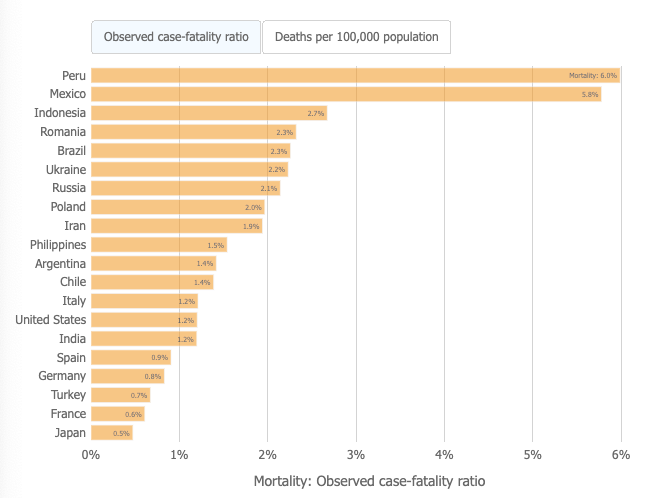
One good thing that has materialized after COVID19 began is that a new mindset has rapidly spread globally. Everyone is trying to become a healthier version of themselves. That’s a good thing and it may help with longevity or quality of life or both! When I think about longevity of life and a quality of life at that last phase, my mind goes straight to blue zones.
Blue zones are the sites on Earth where there exist most centenarians (people over the age of 100) – these are the places where people are forgetting to die… quite literally. These places have become a fascinating topic of discussion for many health practitioners. We’re all thinking what are these places doing RIGHT?
One such place is Okinawa, Japan. A recent article from the European Journal of Clinical Nutrition (EJCN) explores covid19 mortality rates there in Okinawa compared to the whole of Japan.
Now for a baseline, here in the US our COVID19 mortality rate is about 1.2% (from JHU-see chart). This ratio represents death from confirmed COVID19 cases. Japan has one of the lowest COVID19 mortality rates at 0.5%.

Now in Okinawa it was discovered that their COVID19 mortality rate (from 6/16/21) was 0.08%. So that is more than 6 times less than the national rate. WHAT are Okinawans doing to help their health?
Scientists have long observed the Blue Zones and have regarded that the diet and lifestyle are great contributors to the longevity of life there. The Okinawan diet is mostly plant-based with only 3% of calories coming from animal proteins.
Even if we can only substitute some of our animal proteins with plant-based ones, we are able to experience a decreased risk of all-cause mortality. A previous plant-based study also cites increased plant-based substitutions show decreased all-cause mortality. Further previous studies have also shown increased animal-based substitutions increased heart disease mortality. When studies align like this, even across different paths, it’s really good food for thought! After much analysis, the ECJN states that adopting a more plant-based diet could address major risk factors and beneficially impact longevity of life.


